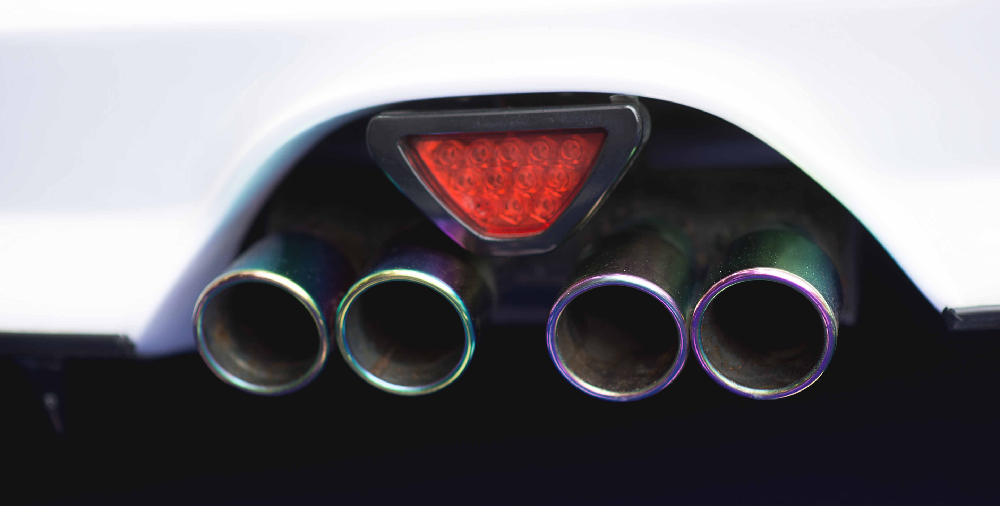The exhaust system is a crucial component of your vehicle that improves its performance, protects the environment from pollution, and muffles the noise from the engine. Unfortunately, an exhaust leak creates a weakness in its design, which impedes its standard functionality.
Loss of engine performance is one of the direct impacts of exhaust leaks. The damage in the exhaust yields reduced back pressure, which subsequently results in less power, fuel efficiency, and acceleration. That said, it’s essential to identify the leak early to maintain superior performance and efficiency of the exhaust. Let’s explore.
Symptoms of an Exhaust Leak
Engine Noise
Creating noise pollution is among the outlawed sources of nuisance in localities. Surprisingly, exhaust leaks are associated with an increase in engine noise. If the leak is located in a more interior position, driving becomes loud, especially during acceleration.
The type of noise depends on the location, size, and shape of the hole. Some of the noises that a leaking exhaust produces include hissing, ticking, popping, and puffing noises. In addition, if the air is escaping through a hole or crack, it’s likely to result in metal vibrations.
Lower Fuel Economy
An exhaust leak can cause you to visit the gas station more frequently. The leak distorts the air to fuel ratio balance which results in incomplete combustion. Depending on the position of the leak, fuel might skip oxygen sensors that are vital for optimum combustion. Ultimately, a leak in the exhaust system reduces the fuel economy.
Loss of Acceleration Power
An exhaust leak impedes the expected acceleration. Instead of pick and go, you’ll need to exert more energy due to loss of power caused by the hole or crack.
Physical Signs
Besides the mechanical effects, you can identify an exhaust leak through observation. You can find black spots that form as a result of carbon build-up in the exhaust system. Auto-technicians use dark marks to identify the source of leaks.
A functional exhaust system keeps fumes away from car occupants. If you smell unfavorable fumes near the engine’s front part, the car exhaust might have a problem.
How to Confirm an Engine Leak
Some of the symptoms associated with an exhaust leak are also similar to other causes. You’ll therefore need a few other tricks to confirm a leak.
Here are a few suggestions:
- Feel By Hand for Leaks: After running the engine, turn it on and listen for a possible leak. You can run your hand a few millimeters above the exhaust to check for any possible air coming out. Liaise with a friend to keep paddling the accelerator as you examine the entire exhaust length.
- Block the Exhaust: Alternatively, you can insert a rag in the pipe opening to make the effect pronounced. By blocking the pipe end, exhaust fumes will try to escape through leaks, making it easy to identify the problem.
- Using Soapy Water: You can use soapy water to identify the problematic areas. Let the car cool down and spray the soapy solution on the suspected areas. When you turn the car back on, the leaking areas will develop foam or bubbles.
What Causes an Exhaust System to Leak
- Shoddy Welding: If a technician does a shoddy job, the system could develop new weak lines that may turn into leaks.
- Physical Impacts: It’s normal to find obstacles such as potholes, debris, and poorly designed bumps on the roads. Physical barriers coupled with a low-hanging exhaust system can cause the exhaust system to develop leaks.
- Wear and Tear: As the car ages, the exhaust system depreciates, resulting in leaks. Equally, gaskets found between the manifold and the engine can degrade over time, allowing for leaks.
Talk to Performance Muffler for Repair and Replacement
An exhaust system is a crucial car component, which is why leaks require a quick diagnosis and fixing. A top-quality exhaust system requires a considerable investment, which compounds the cost of a leak. To that end, Performance Muffler is an ideal service provider for repairs and replacements. We’re located in Phoenix, Peoria, and serve customers throughout Arizona. Contact us to get a quote today.

